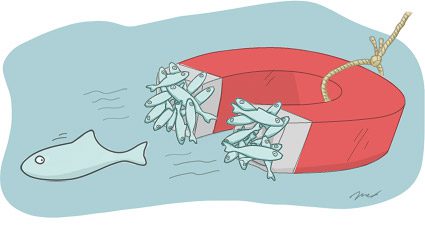Monday September 27, 2010

Research has just begun at the Pacific Northwest National Laboratory (PNNL) on the effects of hydrokinetic renewable energy devices on marine life. The devices use the force of waves, tides and currents in oceans or rivers to generate energy. Proponents of this type of technology estimate that in the U.S. alone, energy captured from waves, tides and river currents could be enough to power over 67 million homes (UCS, 2010). While this technology may have fewer environmental impacts in comparison with other energy sources, the magnetic fields produced may effect the behavior of fish and invertebrates in surrounding waters. Research has shown that some fish, such as sharks and salmon, may use the earth’s magnetic field to navigate their migrations. In particular sharks, skates and rays have a ‘sixth sense’ for magnetism. Using small electroreceptor organs called ampullae di Lorenzini they can detect the magnetic field of the earth. The question is whether these hydrokinetic devices, which may potentially become part of the aquatic landscape, will create magnetic fields strong enough to disrupt the normal behavior of marine life.
Illustration by our own Max Boyd
